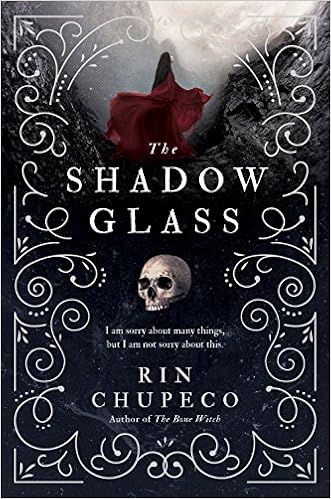Find a Review
Book reviews from Robin, co-host of the Books That Burn podcast. Bookshop links are affiliate links, we may receive a small commission if you purchase from our Bookshop. This content is CAN credentialed, which means you can report instances of harassment, abuse, or other harm on their hotline at (617) 249-4255, or on their website at creatoraccountabilitynetwork.org.
Featured
- Get link
- X
- Other Apps
The Shadowglass by Rin Chupeco (The Bone Witch, #3)
The Shadowglass delivers on the promises made in The Bone Witch and continued in The Heart Forger, weaving a narrative so tight that it has the feel of a well-executed time-travel story, but with nary a time machine in sight. For most to live, magic must die.
I love how Likh’s story is handled. It feels like a quiet revelation, slowly unfolding alongside Tea’s life, subtle but so powerful. All the secondary characters (that ones made it to book three, for this series is not afraid to kill major characters) get to shine in different ways. The villain reveals are surprising while still fitting the previous books, I now have complicated feelings about people I thought I was supposed to like, supposed to dislike... all the feelings. The first book had a lonely quality to it, with just two people talking in the interstitial and Tea trying to navigate this new place in the main story. By the end of the trilogy there are so many amazingly-written characters to love and hate, and to have that feel balanced in both storylines, using the structure to full advantage... I'm just in awe.
The way the interstitial narration and the main story come together is fantastic, it makes me want to immediately re-read the whole trilogy so I can understand all the implications from the start. It allowed for some really dramatic moments where someone shows up in one storyline for the first time then shows up in the other, and it makes one of the moments feel like a reveal even though the character or plot element hadn't shown up explicitly before. This was such a smart way to construct a trilogy (also the perfect length, this structure could work for 1-3 books but probably not more). Dramatic reveals can happen from one perspective then be shown to have been laid in for ages in the next. When I read the first book I was hoping it would hold up all the way through and it did, so well. I have no complaints. What I do have is a wonderful mix of happiness at how the story turns out and sadness that it's over. Normally I'd reach for a time-travel story to give me some of the feelings I got here, and seeing it in a fantasy form is so great, I love all of this.
CW for betrayal, suicidal ideation, death, massacre, gore, descriptions of battle, major character death.

- Get link
- X
- Other Apps
Popular Posts
The Rise and Fall of Snow: Why the Hunger Games prequel is good, actually
- Get link
- X
- Other Apps
When Miserable People Get Happy Endings: "Unlikeable" Protagonists in Alexis Hall's Writing
- Get link
- X
- Other Apps
Comments
Post a Comment